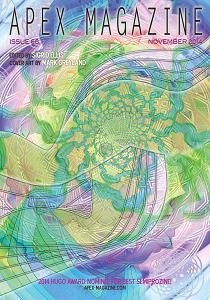Reviewed by Charles Payseur
Two men dig up a bio-nano creature and discover that it might have been buried for a very good reason in Rich Larson‘s “Brute.” Anton, charismatic and calm, and Hume, his friend, find a strange crate during their salvaging and open it up to find a piece of military-grade technology, a creature that bonds to Anton’s body and grants him superhuman powers. At the same time, though, the creature, the brute, begins to change Anton, to make him more aggressive, to take control of his body. At first it seems like another lucky break for Anton, who has always been fortunate, at least when compared to Hume. Eventually the negatives outweigh the perks, and Anton enlists Hume’s help to get rid of the brute, but Hume has some other ideas, including finally stepping out from Anton’s shadow. Told with a fluid tone and some striking imagery, the story moves like most science-gone-wrong tales, filled with human hubris and greed. An entertaining story, it’s also a familiar one, and though the brute is an interesting idea, it doesn’t really explore much new territory.
Chikodili Emelumadu crafts a story about a woman transforming into chocolate because of an ex-boyfriend who couldn’t take a hint and a little help from a miscast spell in “Candy Girl.” Paul, white and foreign and yet sure of his understanding of Manu’s Igbo culture, has flown in for Manu’s wedding only to try and buy magic to try and make her his. Because of his own arrogance and inability to see her as a person, though, the spell goes wrong, transforming Manu into chocolate, into Paul’s favorite chocolates. Meanwhile Manu’s friends and husband scramble to find a way to break the spell, and find instead that the only way out is through. Through Paul, that is. He must eat her, a prospect he relishes but one that ultimately allows Manu a level of freedom. Bitingly funny and unflinching in its portrayal of Paul’s offensive ignorance and rash arrogance, Manu’s transformation is tragic, doomed because she lacks any power to prevent Paul from devouring her. The ending, though, offers some hope, and though it doesn’t erase the damage, it does offer a way forward. Told with a solid voice and sarcastic wit, this story is a must-read.
A young girl who can see and feel the health of machinery struggles to find a place to fit in and be believed in “The New Girl” by Marissa Lingen. Badger, implanted with mods when she was young that were supposed to make her more diplomatic, instead finds that her gifts are for machines and not people, for engines and not emotions. Indeed, her gifts seem to prevent her from being diplomatic, as they give her an insight into mechanics that most people don’t want to believe. When she falls in with a group of rebels, she thinks she has finally found a place to belong, but even there people don’t want to believe her when her gifts go against their experience, when she tells them what they don’t want to hear. Luckily for all of them, not everyone is so quick to dismiss her, and by the end there is hope that she has found her place after all. The story does an excellent job of relating the altered senses that Badger experiences because of her mods, the frustration with having no one believe her because she’s young and new. It’s a fun read, light and well paced and easily digested.
A family’s curse causes their last child to face some very difficult choices in Ginger Weil‘s “The Stagman’s Song.” Living on a lonely mountain in New England, the family lives by killing Stagmen, creatures that sing in the night and run the cold wilds around their house. Killing one marks a person, though, and killing two binds a person to the mountain forever, prevents them from leaving. Killing three kills the hunter. It’s a rather brutal curse, and one that Susan, the last child, must face as her family needs money. Brought up to the mountain by her uncle, she makes her first kill, only to find that the home that she loves might not be enough to keep her planted. And before monetary concerns would force her to kill again and be tied forever in one place, Susan decides to try and find a different way, a less ugly way of living, and one that doesn’t require abandoning her family or home. Dark and violent, the story shows how circumstance can tie people to a place, but also shows that curses are not always hereditary. Effective in its blend of the mundane and the magic, the story is both unsettling and entertaining, and worth a look.
Charles Payseur lives with his partner and their growing herd of pets in the icy reaches of Wisconsin, where companionship, books, and craft beer get him through the long winters. His fiction has appeared or is forthcoming at Perihelion Science Fiction, Heroic Fantasy Quarterly, and Fantasy Scroll Magazine, among others. You can follow him on Twitter @ClowderofTwo
 Apex
Apex